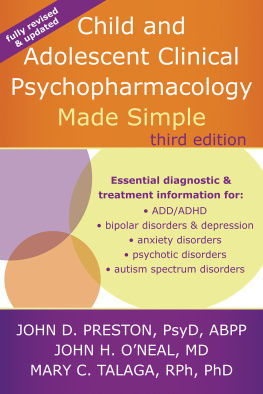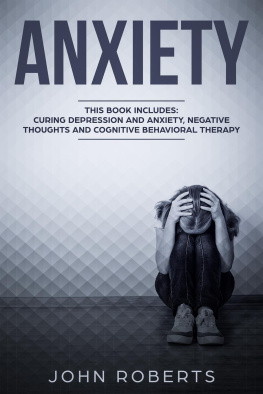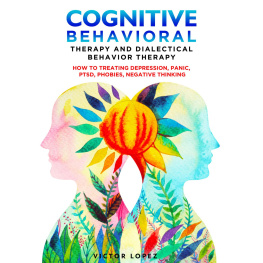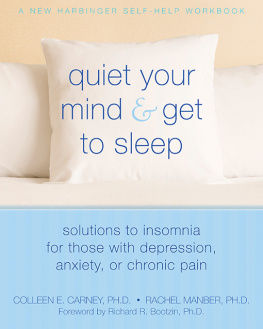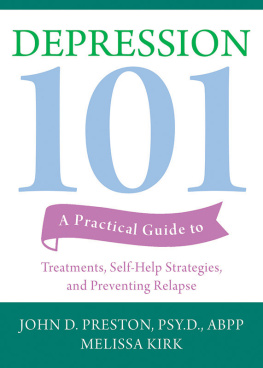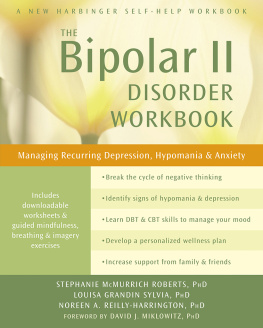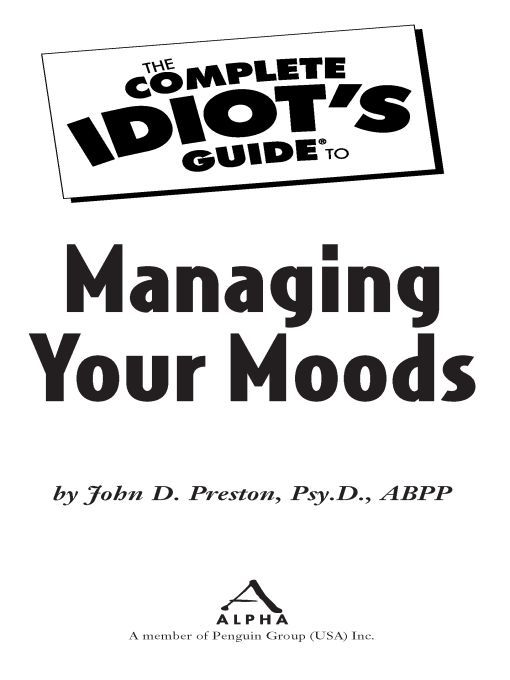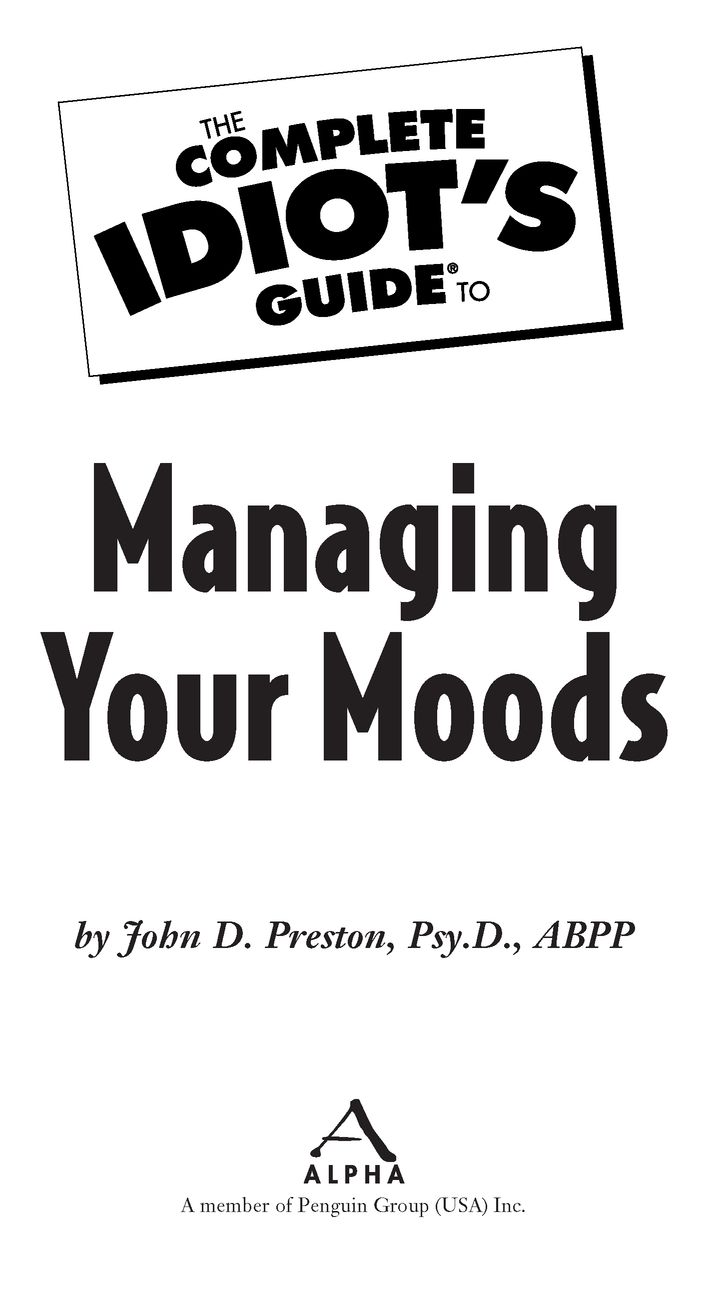Table of Contents
To Jan Groesz
Foreword
Human beings are endowed with a vast range of moods and emotional experiences. While much of our emotional life is positive and rewarding, eventually all of us will encounter stress and strain that will result in significant emotional turmoil and distress. Whats more, as extensive as our emotions are, there is an even greater array of self-help books and psychological therapies that can baffle even the most sophisticated consumer in the mental health marketplace.
This might help explain why, while almost half of the population will experience a psychiatric disorder over the course of their lifetime, and practically everyone else will have times of significant emotional pain and suffering, relatively few people ever seek professional help for their mood problems.
This, in turn, might explain the tremendous popularity and proliferation of self-help books. Theyre a private and generally nonthreatening way for people to get a handle on their emotional distress.
When people are suffering from mood difficulties, however, the last thing they have the motivation or concentration for is to struggle through a dense, voluminous book loaded with complicated jargon and detailed information. This is why The Complete Idiots Guide to Managing Your Moods is such a fantastic and desperately needed addition to the library of self-help books. Like all of the Idiots Guides, it delivers the undiluted crux, the essential take-home points of the material. Yet, amazingly, despite boiling it down to the key ideas, The Complete Idiots Guide to Managing Your Moods remains comprehensive, thorough, down-to-earth, extremely reader friendly, practical, and immediately usable. Moreover, and very important, it destigmatizes and normalizes the many mood problems we humans inevitably experience.
Best of all, this is not a book that will have readers merely embark on a psychoarcheological dig into their unconscious, or excavate insights from their childhood. Nor will it simply provide facts and information. Rather, The Complete Idiots Guide to Managing Your Moods is more like having a personal therapist and life coach that emphasizes the here-and-now and teaches you vital skills while motivating you to take control of your moods by learning and applying a wonderful assortment of strategies and techniques that are firmly grounded in some of the most current scientific knowledge.
But it doesnt stop there! In addition, The Complete Idiots Guide to Managing Your Moods provides an important spiritual component often overlooked by most scientifically grounded books. It also offers crucial information on medical factors that can masquerade as mood problems, psychiatric drugs, and on herbal and over-the-counter products.
As is the case with all Idiots Guides, the bottom line is simple. The Complete Idiots Guide to Managing Your Moods is a fantastic addition to self-help literature. I intend to enthusiastically recommend it to almost all of my patients and colleagues alike.
Clifford N. Lazarus, Ph.D.
Clifford N. Lazarus, Ph.D., is the Co-Founder and Clinical Director of The Lazarus Institute in Skillman, New Jersey (www.thelazarusinstitute.com), a facility dedicated to providing a full range of scientifically verified, evidence-based psychological services. An internationally respected lecturer, he earned his doctorate in clinical psychology at Rutgers University in 1989 and is the author or co-author of more than 20 publications. His two popular books, Dont Believe It for a Minute and The 60 Second Shrink, have been translated into over a dozen languages.
Introduction
Human beings are remarkable in their ability to face so many difficult times in life. The human psyche, like a shock absorber, is adept at helping people go through and bounce back from so many life challenges. Most people are amazingly resilient.
Life can be rewarding and filled with positive experiences: loving friendships, beautiful sunsets, exciting adventures, and new life. Yet, lets face it, life can also be exceedingly difficult. Sooner or later, all of us will encounter a very rough road. All humans must, at some time, face painful losses and disappointments, and sometimes, great tragedy. It is the rare individual who can skate through life and not be bumped and bruised by painful life experiences. Author Jane Wagner states, Reality is the leading cause of stress among those who are in touch with it.
Millions of people suffer from serious psychological disorders such as depression, panic disorder, or bipolar illness. According to the American Psychiatric Association, in their diagnostic manual (DSM-IV: Diagnostic and Statistical Manual of Mental Disorders) a mental or emotional disorder is defined by the presence of particular symptoms. However, central to the definition of a disorder is impaired functioning. Here, emotional symptoms or suffering is severe enough to noticeably interfere with ones ability to adequately carry out the normal tasks of living (for example, the ability to work; to succeed in school to raise children; or to maintain healthy, intimate relationships).
Approximately 40 percent of people experience a psychiatric disorder at some point over the course of their lifetime. One reason this statistic may be so surprising is that most people experiencing a psychological disorder dont tell others about it they keep it private. Almost everyone I know has either experienced a psychiatric disorder or has a loved one who has. Especially common are depression (affecting 17 percent of people over the lifespan) and anxiety disorders (affecting 25 percent of people).
For practically everyone else, there are also at least some times of great struggle and emotional suffering. Countless millions of us may never have a formal psychiatric disorder, but do encounter times when life is incredibly hard. And for many of us, the intensity of emotional suffering (sadness, despair, hopelessness, disappointment, frustration, fear ) goes off the chart, yet we keep going to work, keep raising our kids. We struggle and manage to cope, yet personally grit our teeth and suffer inwardly. Some people are remarkably resilient and do bounce back after living through a difficult time, while others may experience emotional troubles for a lifetime.
Even the founder of psychoanalysis, Sigmund Freud, lived through incredibly difficult times. In one of his last works, Civilization and Its Discontents, he stated, Life as we find it is too hard for us; it entails too much pain and too many disappointments.
Curiosity with a Purpose
Have you ever noticed how large the self-help section is in a bookstore? People in our culture are very interested in psychology in general. Lots of times this is born of curiosity about what makes people tick. We all know people who are especially sensitive or have peculiar habits, and we want to be able to figure them out. This is especially so if they are creating problems in our life. However, probably more likely, most of us buy self-help books because we are having a difficult time. That may be the reason you bought this book. Lots of times emotions can be very confusing, and perhaps its hard to really get a handle on why you feel a certain way or how come you are especially sensitive to certain experiences.



